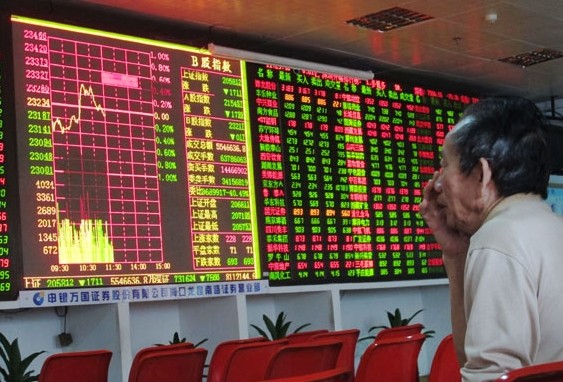

An investor follows the stock index at a brokerage in Haikou, Hainan province, March 4, 2014. SHI YAN/CHINA DAILY
Following a spate of criticism, the securities regulator vows to push forward with registration-based public offerings
The China Securities Regulatory Commission should review its flawed IPO reforms and take corrective action before the next listing wave crushes an already shaky equity market, investors and analysts agree.
"It is clear that the IPO reform of the CSRC has met setbacks. And the stock market will plunge further if the problems are not addressed," said Oliver Meng Rui, a professor of finance and accounting at the China Europe International Business School.
"In my opinion, the CSRC should let it go, rather than taking stopgap measures. The children won't grow up without pain, " he added.
A total of 48 companies had gone public in the Shanghai and Shenzhen bourses by mid-February following the CSRC's December announcement that it was resuming IPO approvals after a 13-month hiatus.
The companies raised 33.5 billion yuan ($5.45 billion) through issuing 2.4 billion shares. By late February, 694 companies were lining up for IPO approvals, the CSRC said in a news release on Friday.
But despite the surging prices of new shares, by the end of January, the benchmark Shanghai Composite Index had fallen 10 percent from the previous month amid rumors of insider trading during the IPO process.
While market observers said there would not be more new IPOs in the short term as current candidates prepare their annual reports for examination by the CSRC, other observers and investors voiced pessimism about the market's outlook.
Xin Yu, president of Guangzhou-based Zequan Investment Co Ltd, noted: "The CSRC said to give investors, not government officials, the primary role in deciding who gets to list and at what price through this reform, but the fact is they keep intervening, and the reform is going nowhere."
According to the latest CSRC guidelines, controlling shareholders are allowed to sell their pre-listing shares during IPOs. But in early January, Jiangsu Aosaikang Pharmaceutical Co Ltd had to postpone its IPO because of pressure from the CSRC.
"I do not agree with the CSRC's logic," said Rui.
The regulators' argument was that Aosaikang was looking for an aggressive cash-out and the price-earnings ratio was too high. But Aosaikang had done nothing illegal or against the rules. If the market accepts it, it should be reasonable. If it falls on its debut, it would simply show that the market did not recognize the price and it would be deserted by investors, Rui added. He also said that it did not make sense for the CSRC to demand that issuers lock in P/E ratios of new shares within the range of industry peers. Price controls curb collusion to create artificially high prices, he said, and to some extent they prevent retail investors from becoming "trapped" by a high IPO price, but they are totally "unnecessary", Rui added.
"Retail investors need to learn that speculating in new shares is risky," Rui said, noting that this would reduce incentives for issuers and underwriters to profiteer from IPOs.
If the CSRC always prioritizes "stability" at the expense of the free market, China's stock market can never mature, he added.
Analysts and investors have criticized the CSRC for intervening too much in the stock market and said that top-down verification cannot effectively prevent fraud or insider trading. What's more, they said, requiring official verification creates room for corruption. CSRC Chairman Xiao Gang responded that the authorities are pushing for registration-based IPO reform step-by-step, after which the authorities will focus on compliance reviews of the new listing candidates.
"The CSRC can do much more than just talk about reform," said independent financial columnist Pi Haizhou.
Pi said that, based on current regulations, 60 percent of new shares issued are allocated to institutional investors, which is unfair to retail investors. He also suggested prohibiting the transfer of pre-listing shares during the IPO process to prevent aggressive cash-outs.
"China's stock market has been developing under governmental intervention since it was established in the 1990s," said Yin Zhongli, deputy director of the Institute of Finance and Banking at the Chinese Academy of Social Sciences.
But such intervention has greatly distorted the pricing of public shares, leading to distortion in new share prices. Even if the authority tried to curb the IPO price, it would quickly hit the upward limit after going to the secondary market, causing a run on new shares, he added.
Rui said a watchdog to strengthen enforcement is badly needed.
"Criminal penalties should be established to deter price manipulation and insider trading. More important, the authority should go after lawbreakers, no matter who they are, no matter who their parents are," Rui added, noting that many brokerage executives are the "second generation" of high-ranking officials.
China‘s IPOs raise nearly $5 billion
2014-02-1443 companies make IPOs on A-share market
2014-02-13Scandal shows IPOs a free-for-all
2014-01-20Chinese companies are flocking to US for IPOs
2014-02-27Copyright ©1999-2018
Chinanews.com. All rights reserved.
Reproduction in whole or in part without permission is prohibited.